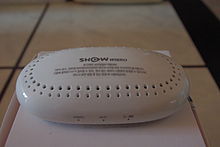This article needs to be updated. (March 2016) |
| WiBro | |
 Wibro Egg sold by KT, produced by Interbro | |
| Korean name | |
|---|---|
| Hangul | 와이브로 |
| Revised Romanization | waibeuro |
| McCune–Reischauer | waibŭro |

WiBro (wireless broadband) is a wireless broadband Internet technology developed by the South Korean telecoms industry. WiBro is the South Korean service name for IEEE 802.16e (mobile WiMAX) international standard. By the end of 2012, the Korean Communications Commission intends to increase WiBro broadband connection speeds to 10 Mbit/s, around ten times the 2009 speed, which will complement their 1 Gbit/s fibre-optic network.[1] The WiBro networks were shut down at the end of 2018.[2][3]
WiBro adopts TDD for duplexing, OFDMA for multiple access and 8.75/10.00 MHz as a channel bandwidth. WiBro was devised to overcome the data rate limitation of mobile phones (for example CDMA 1x) and to add mobility to broadband Internet access (for example ADSL or Wireless LAN). In February 2002, the Korean government allocated 100 MHz of electromagnetic spectrum in the 2.3–2.4 GHz band, and in late 2004 WiBro Phase 1 was standardized by the TTA of Korea and in late 2005 ITU reflected WiBro as IEEE 802.16e (mobile WiMAX). Two South Korean telecom companies (KT, SKT) launched commercial service in June 2006, and the monthly fees were around US$30.
WiBro base stations offer an aggregate data throughput of 30 to 50 Mbit/s per carrier and cover a radius of 1–5 km allowing for the use of portable internet usage. In detail, it provides mobility for moving devices up to 120 km/h (74.5 mi/h) compared to Wireless LAN having mobility up to walking speed and mobile phone technologies having mobility up to 250 km/h. From testing during the APEC Summit in Busan in late 2005, the actual range and bandwidth were quite a bit lower than these numbers. The technology will also offer quality of service. The inclusion of QoS allows for WiBro to stream video content and other loss-sensitive data in a reliable manner. These all appear to be (and may be) the stronger advantages over the fixed WiMAX standard (802.16a). Some Telcos in many countries were trying to commercialize this Mobile WiMAX (or WiBro). For example, TI (Italy), TVA (Brazil), Omnivision (Venezuela), PORTUS (Croatia), and Arialink (Michigan) provided commercial service at some stage. While WiBro is quite precise in its requirements from spectrum use to equipment design, WiMAX leaves much of this up to the equipment provider while providing enough detail to ensure interoperability between designs.
WiBro has a Peak Download speed of 128 Mbit/s and a Peak Upload speed of 56 Mbit/s.
- ^ Malik, Om (February 1, 2009). "By 2012 Koreans Will Get 1Gbps Broadband Connections". Archived from the original on October 19, 2016.
- ^ "Adieu Korean Tech, Wibro". KoreaTechToday. January 2, 2019.
- ^ Cho, Mu-Hyun (December 7, 2018). "KT and SK Telecom to end WiBro service within the year". ZDNet.